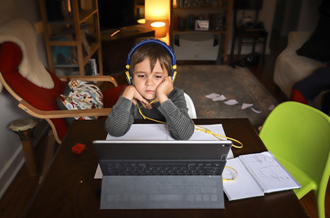 Children lost out on more than one-third of a school years' worth of learning during the COVID-19 pandemic, an analysis has found. Their mathematics skills were more affected than their reading abilities. Children lost out on more than one-third of a school years' worth of learning during the COVID-19 pandemic, an analysis has found. Their mathematics skills were more affected than their reading abilities.
The study, published in Nature Human Behavior , shows that efforts to prevent further learning losses after the pandemic have been successful, but school-aged children have not caught up on the loss of knowledge and skills that they experienced at the start of the pandemic, during which school closures were widespread.
"This is going to be a real problem for this generation that experienced the pandemic in school," says Bastian Betthäuser, a sociologist at the University of Oxford, UK, and a co-author of the study. If not addressed, these learning losses will affect this generation's success in the labour market, he adds.
The COVID-19 pandemic caused the largest disruption to education in history: 95% of the world's student population was affected by school closures. According to the United Nations cultural organization UNESCO, schools suspended in-person teaching for an average of 3.5 months during the pandemic.
The learning slowdown during the pandemic was not just an outcome of school closures, but a combination of factors involving home learning environments. These include "access to learning equipment, computers, digital resources, having a quiet room to work in … and economic insecurity amongst family", says Betthäuser. "The pandemic reinforced learning inequality at the global level.
"
There was a lack of data from lower-income countries, but the study found that children from more disadvantaged socio-economic backgrounds in high- and middle-income countries have experienced larger learning losses. The authors predict that the pandemic's effects on learning will be more severe for children in poorer regions.
"Those students were suffering before the pandemic, they suffered more during the pandemic, and now, as we're trying to get our way out of this, they're going to receive less than others to recover," says Amanda Neitzel, a researcher at the John Hopkins School of Education in Baltimore, Maryland.
Policy initiatives to help children to recover lost learning and skills are urgently needed, researchers say. "This isn't going to be something that we catch up in a year or two, when everything is back to normal i think this is going to be a decade long," says Neitzel. "We need to rethink schooling and make substantial changes to the structure and way that we do education to make this up."
|